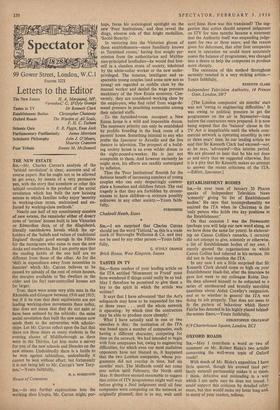TASTES IN TV Srn,—Some readers of your leading article on
the ITA entitled 'Monument to Fraud' must have wondered if things could really be so bad. May I therefore be permitted to give them a key to the spirit in which the article was written?
It says that I have advocated 'that the Act's safeguards may have to be suspended for two or three years . . . until the whole network is operating: by which time the contractors may be able to produce more cheaply.'
What I have actually said in one or two speeches is this : the institution of the ITA was based upon a number of companies, each having a different character, competing for time on the network. We had intended to begin with four companies but, owing to engineering difficulties, for which even our most malicious opponents have not blamed us, it happened that the two London companies, whose pro- grammes did not overlap in time, had six months' start. The Midlands could not come into action nntil February, the North until May. It therefore seemed reasonable to suggest that critics of ITV programmes might well wait before giving a final judgement until all four companies were competing on the network as originally planned; that is to say, wait until
next June. How was this translated? The sug- gestion that critics should suspend judgement on ITV for nine months became a statement that the Authority itself was suspending judge- ment for two or three years; and the reason given for deferment, that after four companies were in operation we could more accurately assess the balance of programmes, was changed into a desire to help the companies to produce more cheaply.
The extension of this method throughout certainly resulted in a very striking article.— Yours faithfully, KENNETH CLARK independent Television Authority, 14 Princes Gate, London, SW7
[The London companies' six months' start was not 'owing to engineering difficulties.' It was owing to political pressure to get the programmes on the air in September—long before the contractors were prepared. It is now being argued that the 'balance' clause in the TV Act is inapplicable until the whole com- mercial network is operating smoothly in two or three years' time. In our leading article we said that Sir Kenneth Clark had excused—not, as he says, 'advocated'—this interim period. We are pleased to hear that he has not done so and sorry that we suggested otherwise. But it is a pity that Sir Kenneth makes no attempt to answer the recent criticisms of the ITA. —Editor, Spectator.]


































 Previous page
Previous page